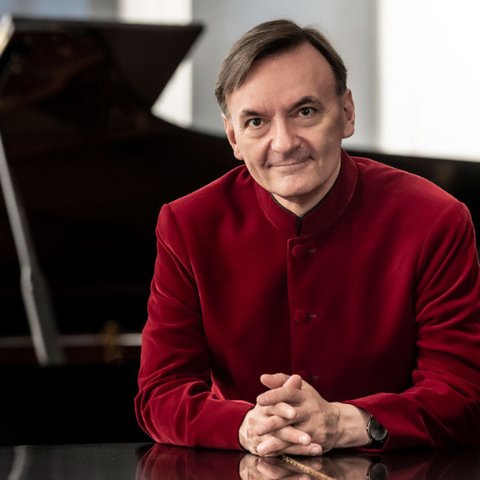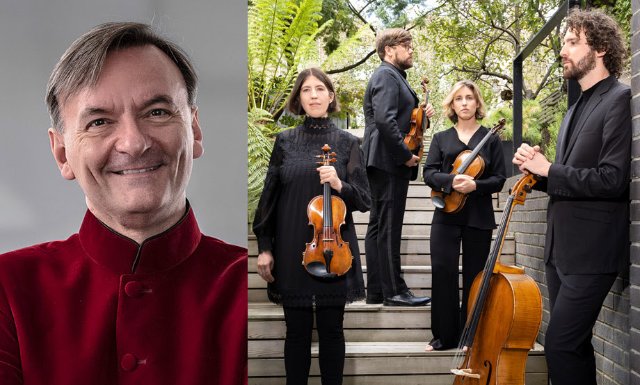Castalian Quartet at the 92nd Street Y
Sir Stephen Hough Pianist and Composer
By: Susan Hall - Mar 12, 2024
The brash and lively Castalian String Quartet and man-for-all-seasons Sir Stephen Hough performed at the Kaufmann Concert Hall at the 92nd Street Y in New York.
Who would start with a classic Haydn string quartet? Haydn invented the form, a conversation between four instruments. Who would follow this with the mention of ‘six’ not four’? Castalian taking on Sir Stephen’s own first string quartet, the reference to ‘six’ is Les Six composers of Paris, whose music is not directly referenced, but rather inferred in the spots they may have inhabited in Paris: a street, a park, a hotel, a theater, a church, and of course, a march. Six locations. Finally, we have a Brahms Quintet, one of the composer’s best known. The work had gone through several forms, finally landing on the Piano quintet which Brahms’ teacher Robert Schumann had made famous. It was quite an evening.
Both the pianist-composer and the Castalian quartet are in the habit of inviting the listening ear into their midst. While a conversation between four string instruments may seem like a private affair, we are invited inside, captured by Haydn’s beautiful high notes the key of A invites in the violin, and the rollicking 16th notes which accompany a melody played by both violins. The minuet is danceable. A fugal conclusion is full of life, not the Sturm and Drang Haydn often ends with.
‘Les Six rencontres” followed. It has an almost jazzy rhythm as we tour Paris and sense the ghosts of composers’ past. Sir Stephen has written: "'Au boulevard’ has ‘Stravinskian spikes elbow across the four instruments, with jagged accents, darting arpeggios and bracing white-note harmonies … the main theme is suddenly transformed into technicolor for the central section, blushed with sentiment and exactly half-tempo. In ‘Au parc’, ‘under a pizzicato accompaniment a gentle, melancholy melody floats and is passed around the players in a haze of decorative variations’, while ‘À l’hôtel’ opens with a bustling fugato, its short subject incorporating repeated notes, an arpeggio and a scale’ and ends with ‘offbeat, snapping chords in pursuit’. ‘Au théâtre’ reveals a ‘skeleton of a motif [which] dances in a recurring harmonic sequence, decorated with each repetition in more and more lurid colours, smeared with lipstick glissandos’, before a change of mood is ushered in by the viola, ‘pushing the music forward to a splashing climax’, followed by a despairing reprise and a conciliatory close. ‘À l’église’ is a ‘serene hymn’ for muted strings, while ‘Au marché’ is a bustling moto perpetuo which moto perpetuo which recalls earlier material and finally returns to the music from the opening of the work."
Hough surprises, often taking a new angle on both a story and its music. It is part of his delight.
Johannes Brahms Quintet for Strings and Piano concluded the program. Sir Stephen performed at the piano. Conversational passages between the five instruments contrasted with the massive forces of the strings.
The opening is crammed with musical ideas, each expressed beautifully, but also leaving you with a question as to what’s most important. Rhythmic precision combines with the singing of the bowed instruments. The galloping Scherzo and the monumental coda suggest a symphony.
Special moments linger: Light chords at the top of the keyboard hover over the melody. Soft tones of the violin and viola offer reprises of the original idea. The ear comes to attention as keys shift quickly. We are jarred by the play of F major to F minor and A natural to A flat. We have entered the composer’s decision-making space and also a daydream. This daydream echoes the daydream of “Les Six’ in which ghosts of six composers wander around Paris and be heard.
We are suspended between public and private spheres. Neither won, which is a tribute to the cordiality of the performers. In the first two works performed, we were in a private sphere. The Brahms takes us back into the real world in steps of unusual beauty. The pianist and the string quartet are at once simple, subtle and grand.
Concerts in which the pianist-composer Sir Stephen Hough is involved are often witty and joyful, like the man himself. Bending over to place the sword on Sir Stephen’s head as he was knighted, King Charles remarked, ‘Thank you for the joy you bring.” With the Castalian Quartet, joy filled the 92nd Street Y.


